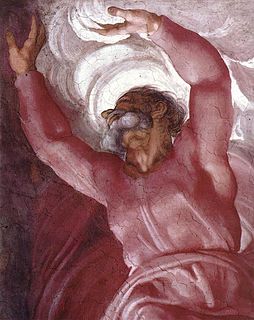
The meaning of life, or the answer to the question: "What is the meaning of life?", pertains to the significance of living or existence in general. Many other related questions include: "Why are we here?", "What is life all about?", or "What is the purpose of existence?" There have been many proposed answers to these questions from many different cultural and ideological backgrounds. The search for life's meaning has produced much philosophical, scientific, theological, and metaphysical speculation throughout history. Different people and cultures believe different things for the answer to this question.

Omnipotence is the quality of having unlimited power and potential. Monotheistic religions generally attribute omnipotence only to the deity of their faith. In the monotheistic philosophies of Abrahamic religions, omnipotence is often listed as one of a deity's characteristics among many, including omniscience, omnipresence, and omnibenevolence. The presence of all these properties in a single entity has given rise to considerable theological debate, prominently including the problem of theodicy, the question of why such a deity would permit the manifestation of evil. It is accepted in philosophy and science that omnipotence can never be effectively understood.
The teleological argument is an argument for the existence of God or, more generally, for an intelligent creator based on perceived evidence of intelligent design in the natural world.

Tawhid is the indivisible oneness concept of monotheism in Islam. Tawhid is the religion's central and single most important concept, upon which a Muslim's entire religious adherence rests. It unequivocally holds that God as per Islam is One and Single.

Hard determinism is a view on free will which holds that determinism is true, that it is incompatible with free will, and therefore that free will does not exist. Although hard determinism generally refers to nomological determinism, it can also be a position taken with respect to other forms of determinism that necessitate the future in its entirety.
The existence of God is a subject of debate in the philosophy of religion and popular culture. A wide variety of arguments for and against the existence of God can be categorized as metaphysical, logical, empirical, subjective or scientific. In philosophical terms, the question of the existence of God involves the disciplines of epistemology and ontology and the theory of value.
Predeterminism is the philosophy that all events of history, past, present and future, have been already decided or are already known, including human actions.
The term Great Work is a term used in Hermeticism and occult traditions descended from it, most prominently Thelema. The Great Work signifies the spiritual path towards self-transcendence in its entirety. This is the process of bringing unconscious complexes into the conscious awareness, in order to integrate them back into oneself. Accomplishing the Great Work, symbolized as the creation of the Philosopher's Stone, represents the culmination of the spiritual path, the attainment of enlightenment, or the rescue of the human soul from the unconscious forces which bind it.
Sufi cosmology is a Sufi approach to cosmology which discusses the creation of man and the universe, which according to mystics are the fundamental grounds upon which Islamic religious universe is based. According to Sufi cosmology, God's reason for the creation of this cosmos and humankind is the "manifestation" and "recognition" of Himself as it is stated in Hadith Qudsi – "I was a hidden Treasure; I desired to be recognized so I created the creature".

This glossary of philosophy is a list of definitions of terms and concepts relevant to philosophy and related disciplines, including logic, ethics, and theology.
Sufi metaphysics is centered on the concept of وحدة waḥdah "unity" or توحيد tawhid. Two main Sufi philosophies prevail on this topic. Waḥdat al-wujūd literally means "the Unity of Existence" or "the Unity of Being." Wujūd "existence, presence" here refers to God. On the other hand, waḥdat ash-shuhūd, meaning "Apparentism" or "Monotheism of Witness", holds that God and his creation are entirely separate.
Svātantrya is the Kashmiri Shaivite concept of divine sovereignty. Svātantrya is described as an energy that emanates from the Supreme (Paramaśiva), a wave of motion inside consciousness (spanda) that acts as the fundament of the world, or in another view, the original word. It does not use any external instrument as it itself is the first stage of creation.
Conceptions of God in monotheist, pantheist, and panentheist religions – or of the supreme deity in henotheistic religions – can extend to various levels of abstraction:
Qadar is the concept of divine destiny in Islam. It is one of Islam's six articles of faith, along with belief in the Oneness of Allah, the Revealed Books, the Prophets of Islam, the Day of Resurrection and Angels. This concept has also been mentioned in the Quran as the "Decree" of Allah.
The argument from consciousness is an argument for the existence of God based on consciousness. The best-known defender of the argument from consciousness is J. P. Moreland.
In epistemology, criteria of truth are standards and rules used to judge the accuracy of statements and claims. They are tools of verification, and as in the problem of the criterion, the reliability of these tools is disputed. Understanding a philosophy's criteria of truth is fundamental to a clear evaluation of that philosophy. This necessity is driven by the varying, and conflicting, claims of different philosophies. The rules of logic have no ability to distinguish truth on their own. An individual must determine what standards distinguish truth from falsehood. Not all criteria are equally valid. Some standards are sufficient, while others are questionable.

The Ahmadiyya Movement in Islam universally accepts the process of evolution, albeit divinely guided, and actively promotes it. Over the course of several decades, the movement has issued various publications in support of the scientific concepts behind the process of evolution and frequently engages in promoting how religious scripture supports the concept.
The will of God or divine will is the concept of a God having a will for humanity. Ascribing a volition or a plan to a God generally implies a personal God. It is often conflated with God's plan.
The question of the eternity of the world was a concern for both ancient philosophers and the medieval theologians and philosophers of the 13th century. The question is whether the world has a beginning in time, or whether it has existed from eternity. The problem became a focus of a dispute in the 13th century, when some of the works of Aristotle, who believed in the eternity of the world, were rediscovered in the Latin West. This view conflicted with the view of the Catholic Church that the world had a beginning in time. The Aristotelian view was prohibited in the Condemnations of 1210–1277.
Secondary Causation is the philosophical proposition that all material and corporeal objects, having been created by God with their own intrinsic potentialities, are subsequently empowered to evolve independently in accordance with natural law. Traditional Christians would slightly modify this injunction to allow for the occasional miracle as well as the exercise of free will. Deists who deny any divine interference past the creation event would only accept free will exceptions. That the physical universe is consequentially well-ordered, consistent, and knowable subject to human observation and reason, was a primary theme of Scholasticism and further molded into the philosophy of the Western Tradition by Augustine and later by Aquinas.





